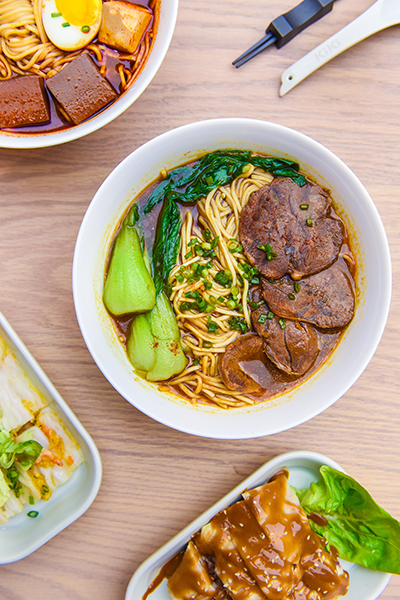Kiki noodles suits China's diners to a tea


The noodles are boiled for more than 5 minutes, a bit longer than soup noodles, and allowed to cool naturally before being mixed with the special sesame sauce. Both the chicken and the flavors transform on the palate from a sour taste to numbing spiciness, before leaving a fragrant aftertaste. Slices of shallot and purple perilla are added to lend a fresh taste to the noodles.
Howard Cai's dishes focus on seafood, such as crab meat and roe mixed noodles, and sea cucumber noodles with abalone sauce, which are also favored by Shanghai diners.
The crab meat and roe are also served with vinegar and crab roe oil, both of which add more flavor to the noodles, as does the thick abalone sauce.
Kiki's yangchun noodles also gives a plain soup noodle a Taiwan-style twist by using pig bone soup and adding stewed, minced pork.
Then there's the "fly-head noodles". It may sound scary, but it's actually noodles mixed with flecks of black beans, chopped chives, diced chilies and minced pork. These strong flavors come together to create a rather moreish dish.
According to Huang, Kiki Tea is a good pairing for noodles, with each cup of tea carefully handmade by the staff.
"All the tea leaves are from Taiwan and the tea has no added flavorings or preservatives," says Huang.
Wax gourd tea with cream mousse and Sichuan pepper flavored bubbles is a signature tipple, since the Sichuan pepper seasoning - freshly made every day - adds an intriguing mouth-numbing quality that's unlike any regular drink and the silky cream cheese foam on top is a perfect blend of quality and texture.
The decor of the restaurant has traces of Suzhou, Jiangsu province, with paintings of trees on the wall and a mini stone landscape in the middle of the large square tables.
"The decoration makes diners feel like there are in the regions south of the Yangtze River, and we hope that diners can come to eat alone without feeling awkward, but instead enjoy a warm and comfortable meal," says Huang.




































